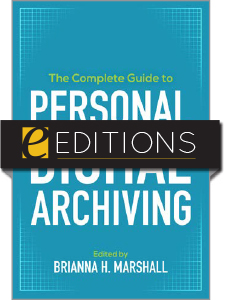
The Complete Guide to Personal Digital Archiving—eEditions e-book
The download link for this product can be found on the final confirmation screen after you complete your purchase, and may also be accessed from your Account Profile. For more information about ALA eEditions file types and how to view them on eReaders, desktop computers, and other devices, see this page.
Primary tabs
You don't need to be an ALA Member to purchase from the ALA Store, but you'll be asked to create an online account/profile during checkout to proceed. This Web Account is for both Members and non-Members. Note that your ALA Member discount will be applied at the final step of the checkout process.
If you are Tax-Exempt, please verify that your account is currently set up as exempt before placing your order, as our new fulfillment center will need current documentation. Learn how to verify here.
- Description
- Table of Contents
- About the author
- Reviews
Scholars and scrapbookers alike need your help with saving their most important digital content. But how do you translate your professional knowledge as a librarian or archivist into practical skills that novices can apply to their own projects? The Complete Guide to Personal Archiving will show you the way, helping you break down archival concepts and best practices into teachable solutions for your patrons’ projects. Whether it’s a researcher needing to cull their most important email correspondence, or an empty-nester transferring home movies and photographs to more easily shared and mixed digital formats, this book will show you how to offer assistance, providing
- explanations of common terms in plain language;
- quick, non-technical solutions to frequent patron requests;
- a look at the 3-2-1 approach to backing up files;
- guidance on how to archive Facebook posts and other social media;
- methods for capturing analog video from obsolete physical carriers like MiniDV;
- proven workflows for public facing transfer stations, as used at the Washington, D.C. Memory Lab and the Queens Library mobile scanning unit;
- talking points to help seniors make proactive decisions about their digital estates;
- perspectives on balancing core library values with the business goals of Google, Amazon, Facebook, and other dominant platforms; and
- additional resources for digging deep into personal digital archiving.
Featuring expert contributors working in a variety of contexts, this resource will help you help your patrons take charge of their personal materials.
Preface, by Brianna H. Marshall
Introduction: Putting Personal Digital Archives in Context, by Chelsea Gunn
Part I Learning about Personal Digital Archives Best Practices
Chapter 1 Archiving Digital Photographs, by Sarah Severson
Chapter 2 Archiving Social Media, by Melody Condron
Chapter 3 Archiving Web Content, by Cameron Cook
Chapter 4 Archiving Audiovisual Materials, by Yvonne Ng
Chapter 5 Assess, Annotate, Export: Quick Recipes for Archiving Your Personal Digital Life, by Jamie Wittenberg and Celia Emmelhainz
Part II Personal Digital Archives and Public and Community Audiences
Chapter 6 The Washington, DC Public Library’s Memory Lab: A Case Study, by Jaime Mears
Chapter 7 Digitizing Memories and Teaching Information Literacy in Queens, NY, by Natalie Milbrodt and Maggie Schreiner
Chapter 8 Community-Based Digital Archiving: The Plateau Peoples’ Web Portal at Washington State University, by Lotus Norton-Wisla and Michael Wynne
Part III Personal Digital Archives and Academic Audiences
Chapter 9 Personal Digital Archives Programming at Liberal Arts Colleges, by Amy Bocko, Joanna DiPasquale, Rachel Appel, and Sarah Walden McGowan
Chapter 10 Supporting Artists’ Personal Archives, by Colin Post
Chapter 11 Personal Digital Archiving as a Bridge to Research Data Management, by Sara Mannheimer and Ryer Banta
Part IV Social and Ethical Implications of Personal Digital Archives
Chapter 12 Avoiding a Gambit for Our Personal Archives, by Matt Schultz
Chapter 13 Digital Photos, Embedded Metadata, and Personal Privacy, by Isaiah Beard
Chapter 14 Black Folk Magic: An Autoethnography of Digitally Archiving Black Millennialhood, by Camille Thomas
Chapter 15 Absent Others: Contemporary Mourning and Digital Estates, by Angela Galvan
About the Contributors
Index
Brianna H. Marshall
Brianna Marshall is director of research services at the University of California, Riverside. Previously, she was digital curation coordinator at the University of Wisconsin-Madison. She holds master of library science and master of information science degrees from the Indiana University School of Informatics and Computing.
”The book made so many points that I found interesting, surprising or important ... The contributors recommend specific tools, and describe the practicalities of setting up digitization labs. They are generous with sharing their own lesson plans and outlines for workshops. Each chapter includes an impressive range of 'Further Resources,' from podcasts to dissertations to LibGuides."
— Archive Robin
"The structure of the guide progresses through four sections, from the concrete and specific to the theoretical, through instructions, examples of institutional programs, and big-picture concerns. The sections work well enough independently to be used by one professional at different points of need or by multiple staff members representing different functions within their institution ... Understanding and testing the concepts put forward in this guide provides a means to build the knowledge and familiarity with tools needed for institutional and personal digital archiving programs alike.”
— New England Archivists Newsletter
"A collection of thoughtful essays on common practices, case studies and instructional programs, and ethical implications related to the management and preservation of personal data ... The contributions in this volume are incredibly useful, especially for librarians and archivists developing or interested in becoming involved in PDA programs.”
— Archival Issues


